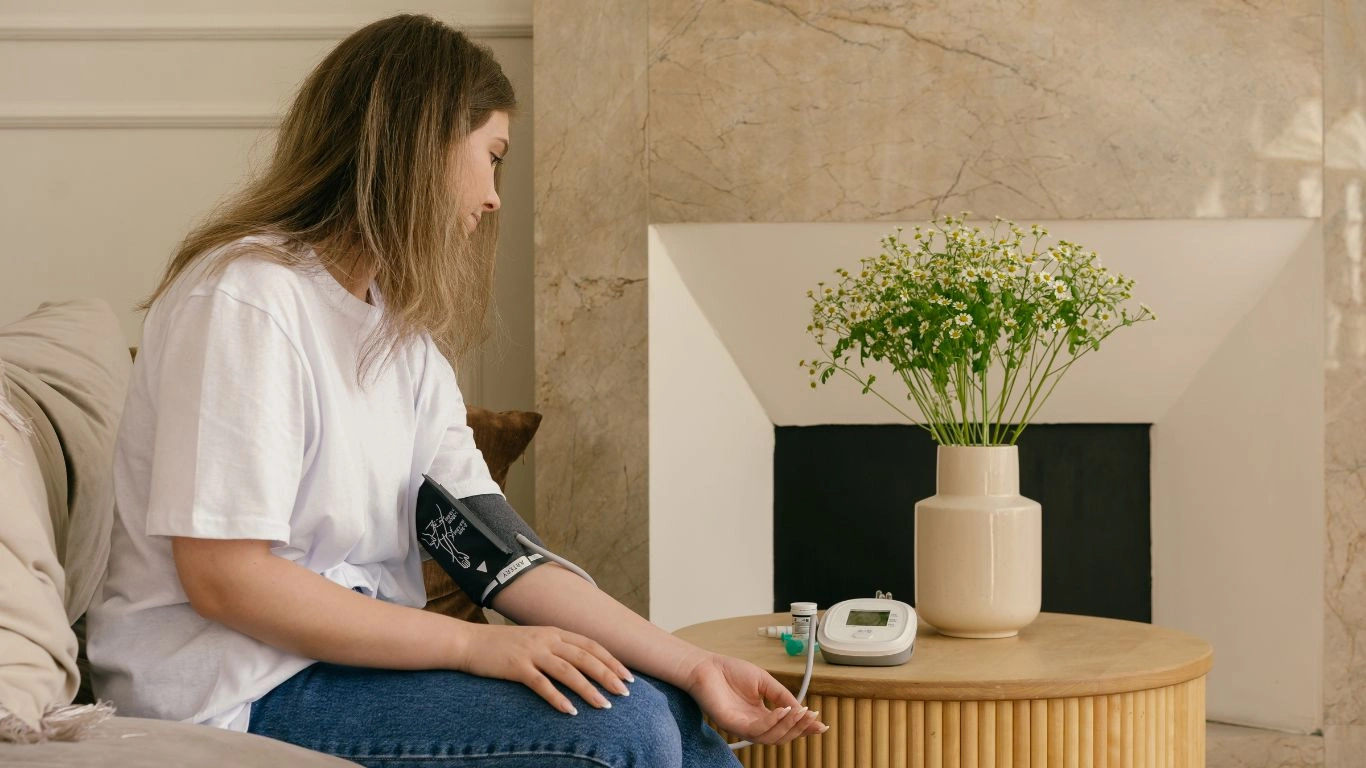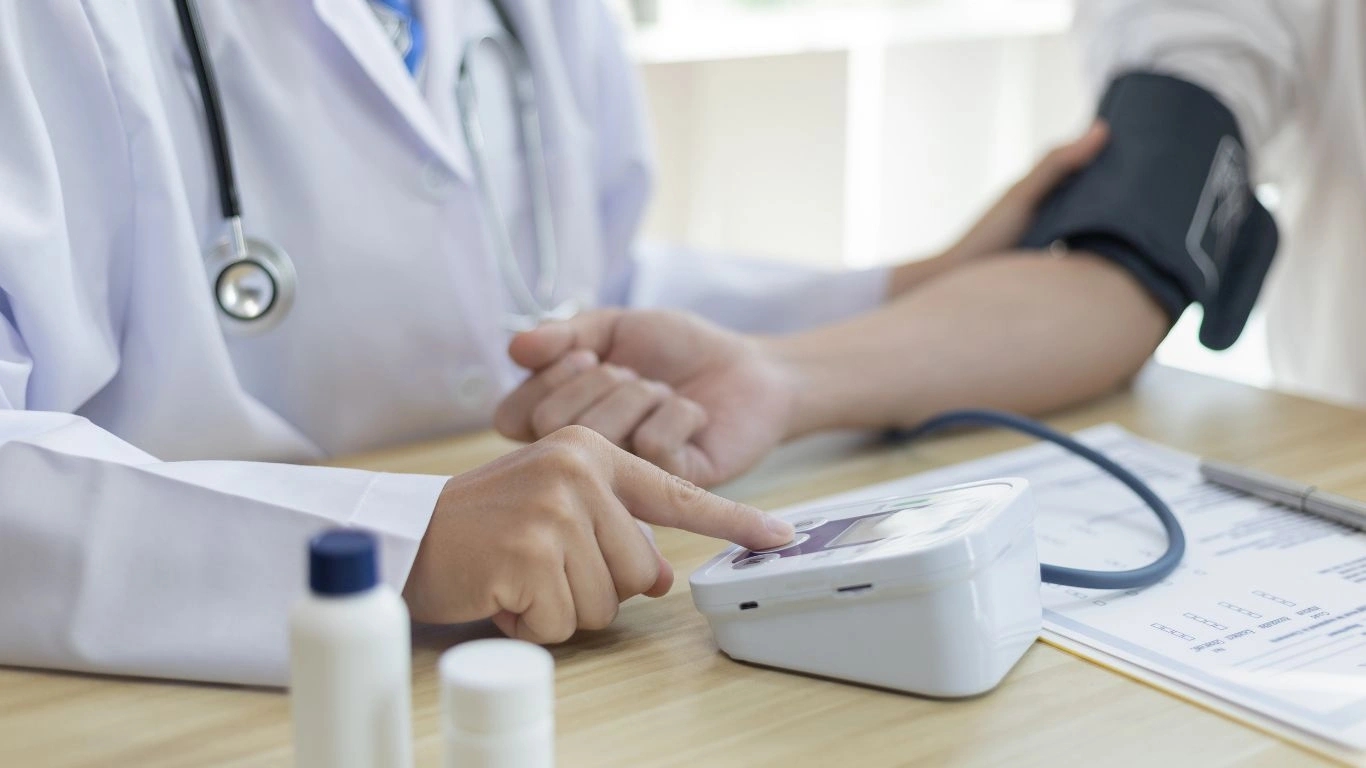Prevent Stress-Induced Blood Pressure Spikes & Protect Your Heart
Stress is an unavoidable part of life, but did you know it can wreak havoc on your blood pressure? If you’ve ever felt your heart racing after a heated argument or a stressful day at work, you’ve likely experienced a stress-induced blood pressure spike. As someone who has spent years studying hypertension and helping patients manage their numbers, I can tell you—this is not something to ignore. The good news? There are simple, effective ways to keep these sudden surges in check.
Understanding the Connection Between Stress and Blood Pressure

Before we dive into solutions, let’s talk about why stress causes your blood pressure to spike in the first place. When you’re stressed, your body releases a surge of hormones like adrenaline and cortisol. These hormones make your heart beat faster, constrict blood vessels, and temporarily raise blood pressure. While occasional spikes aren’t a big deal, frequent stress-related increases can lead to long-term hypertension, which puts you at risk for serious health issues like heart disease and stroke.
Common Triggers of Stress-Induced Hypertension
Not all stress is created equal. Some triggers are more likely to send your blood pressure soaring:
- Work Pressure: Tight deadlines, demanding bosses, and workplace drama can create chronic stress.
- Financial Worries: Money troubles are a major source of stress, leading to sleepless nights and rising blood pressure.
- Family and Relationship Issues: Arguments, misunderstandings, or caregiving responsibilities can elevate stress levels.
- Health Concerns: Worrying about medical conditions, especially if you already have high blood pressure, can add to the cycle.
- Overcommitment: Trying to juggle too many responsibilities without downtime puts constant pressure on your body.
How to Prevent Stress-Induced Blood Pressure Spikes

Now that we’ve identified the culprits, let’s talk solutions. The key to preventing stress-induced blood pressure spikes is to be proactive. Here are my top recommendations, based on both research and personal experience with patients:
1. Master the Art of Deep Breathing
One of the quickest ways to bring down a stress spike is deep breathing. When I coach my patients, I often recommend the 4-7-8 method:
- Inhale deeply through your nose for 4 seconds.
- Hold your breath for 7 seconds.
- Exhale slowly through your mouth for 8 seconds.
- Repeat 3-5 times.
This technique activates your parasympathetic nervous system, which helps lower blood pressure naturally. Plus, it’s easy to do anywhere—whether you’re stuck in traffic or prepping for a big presentation.
2. Prioritize Quality Sleep
Lack of sleep is a major stressor, and guess what? It also raises blood pressure. If you find yourself tossing and turning at night, try:
- Maintaining a consistent bedtime (yes, even on weekends!)
- Avoiding screens an hour before sleep—blue light disrupts melatonin.
- Creating a relaxing bedtime routine, like reading or taking a warm bath.
I’ve seen patients drop their blood pressure significantly just by improving their sleep habits.
3. Move Your Body—But Make It Enjoyable
Exercise is a fantastic stress reliever, but if you hate running, don’t force it! Find an activity you actually enjoy, like:
- Dancing in your living room (my personal favorite for a quick stress-buster!)
- Taking a scenic walk in nature
- Practicing yoga or tai chi
- Hitting a punching bag—great for releasing pent-up frustration
Even 10-15 minutes of movement can help counteract the effects of stress on blood pressure.
Final Thoughts (For Now!)

Managing stress is a lifelong journey, and preventing stress-induced blood pressure spikes requires a combination of awareness, lifestyle changes, and self-care. In the next section, we’ll explore more advanced strategies, including diet, mindfulness techniques, and long-term stress management approaches.
Nutrition: Your Secret Weapon Against Stress-Induced Blood Pressure Spikes

Let’s talk about something we all love—food. What you put on your plate can either help you keep stress and blood pressure under control or make things worse. Over the years, I’ve seen patients make simple diet changes that led to remarkable improvements in their blood pressure readings.
1. Load Up on Magnesium-Rich Foods
Magnesium is a powerhouse mineral when it comes to relaxation. It helps calm the nervous system, reducing the likelihood of stress-induced blood pressure spikes. Some of my favorite magnesium-packed foods include:
- Dark leafy greens (spinach, kale, Swiss chard)
- Avocados (bonus: they’re great for heart health!)
- Almonds, cashews, and sunflower seeds
- Dark chocolate (yes, you read that right—just keep it at 70% cocoa or higher)
2. Cut Back on Processed and Salty Foods
Salt is a sneaky culprit behind high blood pressure. While your body does need some sodium, excessive amounts—especially from processed foods—can cause fluid retention and make your heart work harder. If you want to keep stress-related spikes under control, try:
- Swapping out processed snacks for whole foods
- Using fresh herbs and spices instead of salt for seasoning
- Opting for home-cooked meals instead of fast food
One of my patients replaced their daily bag of chips with unsalted nuts and fresh fruit, and within a month, their blood pressure readings had already improved.
3. Hydration Matters More Than You Think
Dehydration can sneakily contribute to higher blood pressure. When you’re stressed, your body needs even more water to function optimally. Make sure you’re drinking at least 8 glasses of water a day—and even more if you’re active or live in a hot climate.
Mindfulness and Stress Management: A Game-Changer for Blood Pressure Control

Now, let’s get into the mental side of things. I can’t stress this enough—your mindset plays a huge role in managing blood pressure. If you’re constantly tense, worried, or overwhelmed, your body is going to react accordingly.
1. Practice Meditation and Mindful Breathing
I used to think meditation was just for monks or people who had hours to spare. But after recommending it to patients—and trying it myself—I’m convinced it’s one of the best tools for preventing stress-induced blood pressure spikes. Here’s a simple way to start:
- Find a quiet spot and sit comfortably.
- Close your eyes and take a slow, deep breath in through your nose.
- Exhale gently through your mouth.
- Focus on your breath, letting go of any stressful thoughts.
- Repeat for just 5 minutes a day (you can gradually increase the time).
This small habit can make a big difference over time.
2. Try Progressive Muscle Relaxation
If you ever feel tension building in your body, progressive muscle relaxation is a simple but effective way to release it. Here’s how it works:
- Start at your feet and slowly tense your muscles for a few seconds.
- Relax them completely and notice the difference.
- Move up through your body (calves, thighs, shoulders, neck) until you reach your head.
It’s almost like giving yourself a deep relaxation session, and trust me—it works wonders for blood pressure.
3. Laugh More, Seriously
Have you ever noticed how good you feel after a deep belly laugh? That’s because laughter reduces stress hormones, boosts circulation, and improves heart health. Whether it’s watching your favorite comedy, spending time with funny friends, or playing with a pet, don’t underestimate the power of laughter as a stress reliever.
Social Support and Connection: The Underrated Blood Pressure Regulator

Here’s something I’ve seen over and over again: people with strong support systems tend to handle stress—and blood pressure—much better than those who isolate themselves.
1. Lean on Family and Friends
Sometimes, all it takes is a phone call or coffee date with a friend to melt away stress. If you’re feeling overwhelmed, don’t keep it bottled up—reach out to someone you trust. Sharing your worries lightens the load and can prevent stress from taking a toll on your health.
2. Engage in Group Activities
Whether it’s a yoga class, a book club, or a local volunteer group, being part of a community gives you a sense of belonging. Plus, social interaction boosts oxytocin levels, which counteracts stress hormones and keeps your blood pressure steady.
3. Set Boundaries for a Healthier Mind
One of the biggest lessons I’ve learned from working with hypertension patients is this: learning to say no is a form of self-care. If you constantly take on more than you can handle, stress will follow. Prioritize your well-being by setting clear boundaries—whether at work, in relationships, or with daily commitments.
In the next section, we’ll dive into even more advanced strategies, including supplements, alternative therapies, and how to track your blood pressure trends effectively.
Supplements and Natural Remedies for Stress-Induced Blood Pressure Spikes

While lifestyle changes should always be the foundation of blood pressure management, certain supplements and natural remedies can give you an extra edge. Over the years, I’ve seen patients experience noticeable improvements by adding the right nutrients to their routine. Of course, always check with your healthcare provider before introducing anything new—especially if you’re already on medication.
1. Omega-3 Fatty Acids
Omega-3s are well-known for their heart-protective benefits. These healthy fats reduce inflammation, improve circulation, and help stabilize blood pressure levels. The best sources include:
- Fatty fish like salmon, mackerel, and sardines
- Chia seeds and flaxseeds
- Fish oil or algae-based supplements
One of my patients who struggled with frequent stress-induced spikes saw a remarkable difference just by adding a high-quality fish oil supplement to their daily routine.
2. Adaptogenic Herbs: Nature’s Stress Busters
If you haven’t heard of adaptogens, they’re a game-changer for stress resilience. These natural herbs help regulate cortisol levels, keeping your body in better balance. Some top choices include:
- Ashwagandha: Reduces stress and supports adrenal health.
- Rhodiola Rosea: Enhances mental clarity and fights fatigue.
- Holy Basil (Tulsi): Known as the “elixir of life” for its calming properties.
Personally, I’ve found ashwagandha to be incredibly helpful. I started using it during a particularly stressful time in my life, and I noticed a tangible difference in my energy levels and blood pressure stability.
3. Coenzyme Q10 (CoQ10)
CoQ10 is a powerful antioxidant that supports heart health by improving circulation and reducing oxidative stress. It’s especially helpful for those with hypertension, and I often recommend it to patients looking for natural support. You can find it in:
- Organ meats (liver, heart, kidney)
- Fatty fish like tuna and salmon
- Supplements (ideal for those who don’t eat a lot of animal products)
Tracking and Monitoring: Know Your Blood Pressure Patterns

One of the biggest mistakes people make is only checking their blood pressure at the doctor’s office. The truth is, blood pressure fluctuates throughout the day, and if you’re prone to stress-induced blood pressure spikes, it’s important to track your trends so you can identify triggers.
1. Invest in a Reliable Home Blood Pressure Monitor
If you don’t already have one, now is the time to get a good home monitor. Here’s what to look for:
- An upper-arm cuff (wrist monitors can be less accurate)
- Automatic inflation for easy use
- A memory function to track readings over time
One of my patients discovered that their spikes happened consistently after work, which helped them implement stress-relief strategies before heading home.
2. Track Patterns and Identify Triggers
Keeping a simple log of your readings along with notes about your mood, meals, and stress levels can be incredibly revealing. Some things to pay attention to:
- Are your numbers higher after certain meals?
- Do stressful meetings cause a noticeable spike?
- Does a lack of sleep correlate with elevated readings?
3. Know When to Seek Medical Help
While lifestyle changes can have a huge impact, sometimes medical intervention is necessary. If your readings are consistently high despite your best efforts, it’s important to consult your doctor. Uncontrolled hypertension can lead to serious complications, so don’t ignore persistent spikes.
Final Thoughts on Preventing Stress-Induced Blood Pressure Spikes
Stress is an inevitable part of life, but it doesn’t have to control your blood pressure. By incorporating smart lifestyle choices, mindful stress management, and possibly some natural supplements, you can significantly reduce the impact of stress on your heart health.
Remember, the goal isn’t to eliminate stress entirely (because let’s be real—that’s impossible). Instead, it’s about building resilience and equipping your body with the tools it needs to handle stress in a healthy way.
So, whether it’s prioritizing sleep, embracing meditation, tweaking your diet, or tracking your blood pressure trends, take small steps today for long-term benefits. Your heart—and future self—will thank you.
References
Disclaimer
The information in this article is for educational purposes only and should not be considered medical advice. Always consult your healthcare provider before making changes to your health routine, especially if you have existing medical conditions or are taking medications.

Dr. Gwenna Aazee is a board-certified Internal Medicine Physician with a special focus on hypertension management, chronic disease prevention, and patient education. With years of experience in both clinical practice and medical writing, she’s passionate about turning evidence-based medicine into accessible, actionable advice. Through her work at Healthusias.com, Dr. Aazee empowers readers to take charge of their health with confidence and clarity. Off the clock, she enjoys deep dives into nutrition research, long walks with her rescue pup, and simplifying medical jargon one article at a time.







